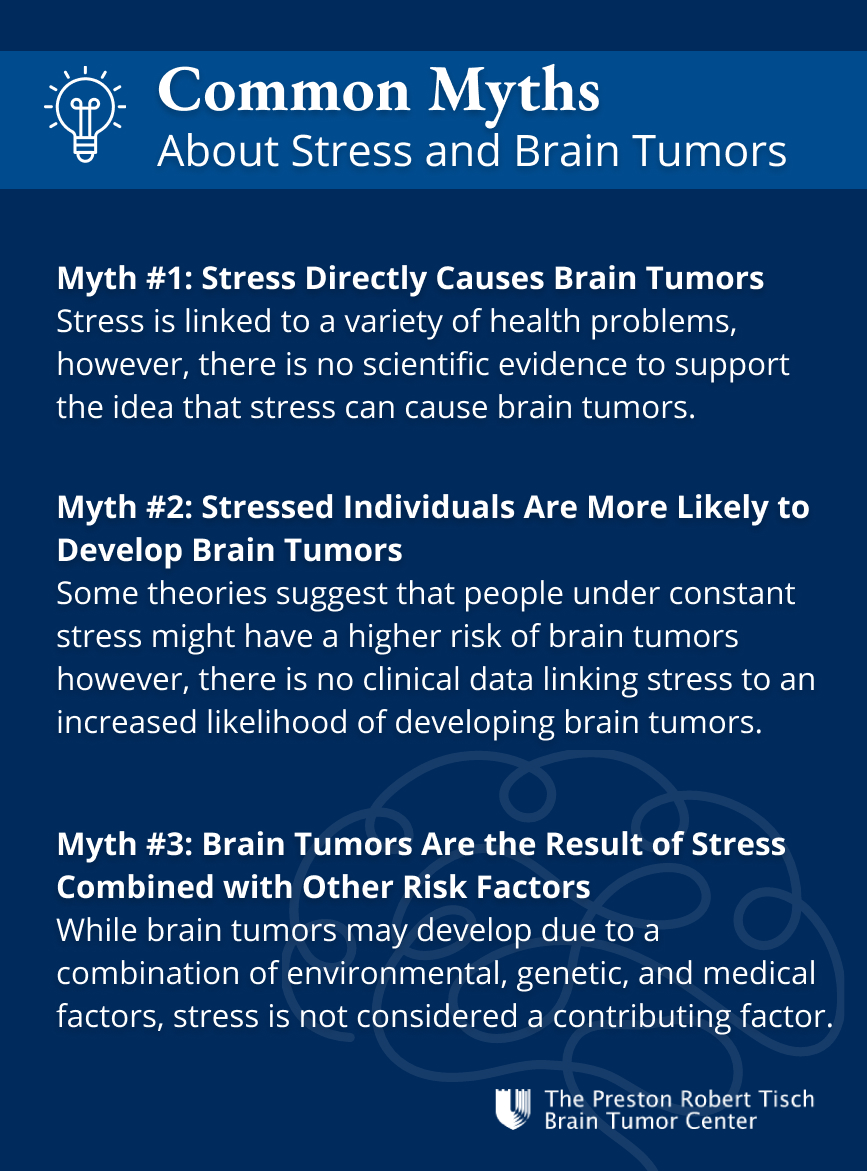Can Stress Cause Brain Tumors?

Stress is an unavoidable part of life. But can stress actually cause brain tumors?
There’s no shortage of claims that stress can cause brain tumors, but what does research really say? Let’s explore the most common myths and explore the facts:
Common Myths About Stress and Brain Tumors
While stress impacts the immune system and other bodily functions, research has not found a direct causal relationship between stress and the formation of brain tumors. Let’s take a deeper look:
Myth #1: Stress Directly Causes Brain Tumors
It’s easy to see why some believe that chronic stress could cause brain tumors. Stress is linked to a variety of health problems, such as heart disease, high blood pressure, and depression. However, there is no scientific evidence to support the idea that stress can cause brain tumors.
Myth #2: Stressed Individuals Are More Likely to Develop Brain Tumors
Some theories suggest that people under constant stress might have a higher risk of brain tumors because stress can suppress immune function, making the body more vulnerable to illness. However, there is no clinical data linking stress to an increased likelihood of developing brain tumors.
Myth #3: Brain Tumors Are the Result of Stress Combined with Other Risk Factors
While brain tumors may develop due to a combination of environmental, genetic, and medical factors, stress is not considered a contributing factor. Experts agree that some known risk factors include:
- Radiation exposure (especially to the head)
- Genetic mutations and family history
- Certain medical conditions or previous cancer treatments

What Does the Research Say?
The scientific consensus is clear: stress does not cause brain tumors. While chronic stress can affect the immune system and overall health, there is no evidence that it leads to brain tumor development. Brain tumors result from a complex interaction of factors, such as genetic mutations, radiation exposure, or environmental influences—not stress.
At Duke’s Preston Robert Tisch Brain Tumor Center, research is at the core of advancing brain tumor care. The Neuro-Oncology Research Program focuses on preventing, diagnosing, and treating primary malignant brain tumors in both children and adults. Key aspects of Duke’s research mission include:
- Discovering genetic and molecular causes behind brain tumors through cutting-edge studies.
- Developing innovative models to test therapeutic compounds before they reach clinical trials.
- Translating new treatments into trials with advanced trial designs.
- Building a comprehensive brain tumor repository in partnership with the Duke Cancer Institute.
- Training the next generation of neuro-oncologists and promoting research in patient care.
This commitment to both research and care gives our patients access to the latest therapies and clinical trials,
💡 Want to learn more? Read our blog: Everything You Need To Know About Brain Cancer.
Discover the Top Brain Tumor Center
At the Preston Robert Tisch Brain Tumor Center, we have a team of leading physicians and neuro-oncology specialists who are dedicated to helping those who have been diagnosed with brain cancer. Our experts collaborate to create personalized treatment plans tailored to each patient's needs.
If you or someone you love needs help, please visit our website to schedule an appointment with one of our world-renowned doctors at our Durham, North Carolina clinic. We are committed to providing outstanding patient care and always strive to offer hope to anyone facing a brain tumor diagnosis.
FAQs: Stress and Brain Tumors
Can emotional stress cause a tumor?
No, emotional stress is not linked to the development of tumors, including brain tumors. However, stress can impact mental health and well-being.
Which is often the first manifestation of a brain tumor?
Seizures are a common first symptom, especially in patients without a history of epilepsy. Persistent headaches and vision changes are also early indicators.
Can anxiety be a symptom of a brain tumor?
Yes, anxiety and mood changes can occur if the tumor affects brain regions involved in emotional regulation. However, anxiety alone is not a definitive sign of a tumor.
Can too much stress cause brain damage?
Chronic stress can impact brain function by shrinking areas like the hippocampus, which is involved in memory, but it does not cause tumors